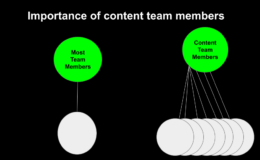Content marketers have taken the storytelling bit too far. OK, your brand has a story. Now what? The web is now littered with blog after blog highlighting instances of how storytelling is setting businesses of all types afire. I don’t see it. While storytelling can be a strong, binding element of your business, it is no replacement for substance.
The best storytelling in the world won’t save a crappy idea or rescue you from customers’ exodus following poor service.
I get the feeling that, in most of these instances at least, the “benefits” are being overplayed by folks who’ve never had to live with the outcome of the “storytelling-is-all-you-need” advice they are dispensing.
Below I share an experience that highlights why you need more than a great story to grow a successful business.
The benefits of storytelling have been greatly exaggerated.
“OK, Ronell … Now what?”
I was caught off-guard for a moment, forced back onto my heels as a prospect looked across the table at me and wanted an answer I wasn’t yet ready to provide. He’d come to me for content strategy help, then asked for my assistance in the branding efforts of his soon-to-be-opened restaurant, which would occupy a very competitive niche.
I immediately spotted several problems, specifically the logo, tagline and positioning of the company in the space. We then chatted briefly about local SEO, and I had several ideas for way to better integrate social media with what they were also doing offline. Because the business would be located in a small suburban town, where folks are more likely to a worthwhile business, I inquired about community building and steps they’d taken to integrate the residents into the narrative of the business.
“You have a great story, one that will certainly resonate with the community,” I said. “You have to share it. It binds the restaurant to the location and the community, and fosters a sense of this-is-your-place, togetherness that closely aligns with the local ethic and their desire for a unique dining experience.”
His eyes lit up when I shared the value of sharing their story.
Right there, on the spot, using nothing put a ballpoint pen and eight Sticky Notes, I cobbled together the main elements of the brands story and created a makeshift content strategy. It’s one he beamed at and was ready to rush off to greet his partners with it.
Then he asked that question. “OK, Ronell … Now what?”
Storytelling telling is an element of your business, not the end goal.
I wasn’t thrown off at his asking me what came next. What hit me was that, for someone who reads as much as I do, I see very little talk about what it takes for small and midsize businesses to be successful beyond the story.
You can score the biggest home-run with storytelling but still lose the game.
Being a content strategist and writer is what opens the door for most of the work that I do, but when those doors open, I get to look around and see every aspect of the business. All too often, I’m asked to make sense of some bad advice they were given that led the company down a long, expensive, unproductive path. In every case this advice s provided my someone who’d been out the picture well before the inefficacy of their advice could be exposed.
How convenient.
A friend of mine, a prominent consultant from the Midwest, likes to say “Don’t take advice from a person who has never had to live through the decisions they’ve made or asked others to make at their behest.” I agree. Totally.
Moving beyond storytelling
Those people get “found out” soon enough. But to the hordes of bloggers preaching the gospel of “storytelling-is-all-you-need,” the insanity has got to stop. It’s about way, way, way more than storytelling, people.
Apparently, I’m not alone in sharing this sentiment. Kate Kiefer, content expert for MailChimp, shared this tweet years ago, and it a decade ago and it has aged well.
Unfortunately, those of us beating the “storytelling-as-everything-is-BS” drum are being drowned out by the cacophany on the other side.
I get it. I really do.
These so-called experts are selling businesses on the notion that storytelling is the key to why this or that company was successful. Indeed, many of the companies—Moz, Nike, Whole Foods, etc.—these experts point to as examples of how storytelling made them successful are shining examples of corporate success. The issue, though, is one of semantics.
These companies have a great story and are successful, in part because the story curried them favor with early-adopters in their space. It is not the case, however, that these companies are successful because they had a story.
Correlation is not causation.
Telling your brand’s story can bind a business and its customers in extraordinary ways, particularly if the story involves elements of surprise, adversity, heroism, heartache, passion and an ability to achieve through great adversity. It is, after all, a story.
But even the best story is just a story.
It’s ultimately the decisions, products, services, employees, sales, marketing, advertising, PR and the like that have the greatest impact on the success or failure of a company, not the story itself.
Having a great story is a great starting place, but I liken it to the old saw about charm.
“You can get by on charm for about 15 minutes, but after that, you’d better know something.”
Apparently realizing this, the prospect I was helping out began to see the story for what it was, a help to his business. A strong, compelling story can do the same for your business. Just don’t buy into the notion that it only takes a story.
That’s a tale being sold each day. You don’t want to be a buyer in this market. Hopefully, in the future, I wont find myself saying, “Yes, you have a brand. Now what?” as much as I have in recent years.





